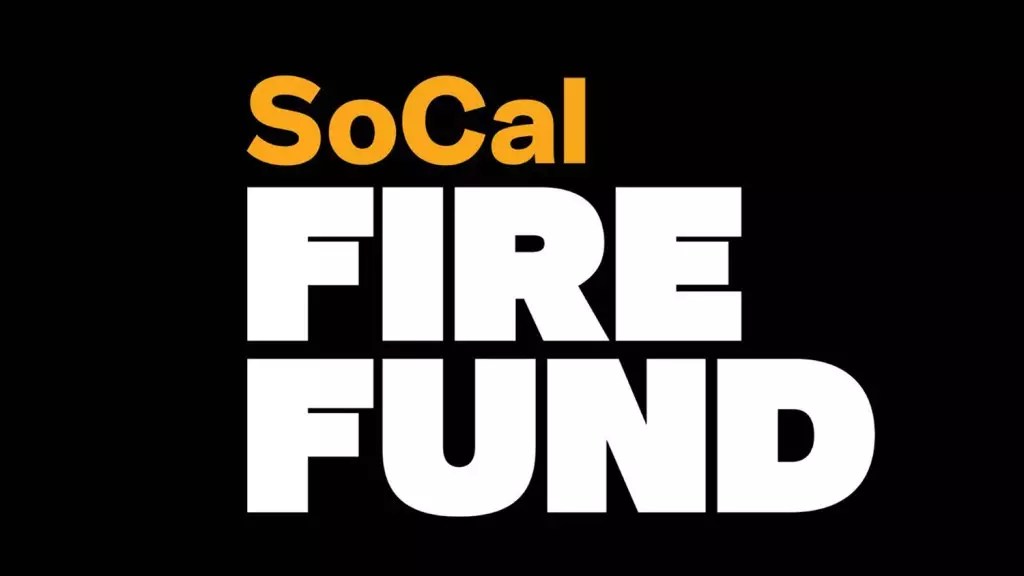The fires in Southern California fueled by strong winds have wreaked havoc, devastating communities and displacing countless families. While natural disasters often reveal the fragility of human life and infrastructure, they simultaneously inspire extraordinary acts of solidarity. In response to the immense challenges posed by these fires, the entertainment industry in the region has rallied to provide practical assistance and emotional support to the affected communities. One of the notable initiatives emerging from this calamity is the SoCal Fire Fund, a collaborative effort spearheaded by key organizations, including the CAA Foundation, CORE, and the Los Angeles Unified School District Education Foundation.
The SoCal Fire Fund represents a powerful convergence of resources and compassion within the entertainment sector. It was developed with the intent of delivering both immediate relief and long-term recovery strategies for those hit hardest by the fires. The CAA Foundation, known for its philanthropic endeavors, pooled initial funding to initiate this project. Meanwhile, CORE has leveraged its established network to reinforce the fund’s outreach and impact, ensuring that it not only serves as a stopgap measure but also lays the groundwork for sustainable recovery.
The organizers have aptly pointed out the unique challenges faced by vulnerable communities. With numerous families grappling with the loss of their homes and lives, the fund is crafted to address these pressing issues holistically. CAA leaders, recognizing the personal toll on their employees and community members alike, emphasize the necessity for a nimble and adaptive response to recovery that aligns with the diverse needs of those affected.
In her passionate appeal, Natalie Tran, Executive Director of the CAA Foundation, highlighted the urgency of the situation, stating that the “scope of loss” calls for a coordinated and empathetic response. Her earnest invitation to individuals, organizations, and businesses to participate underscores the idea that collective action can yield more significant results. It reflects a sentiment that is particularly resonant during disasters: the notion that no one should face adversity alone, and that community support can create pathways to recovery.
Furthermore, Ann Lee, Co-Founder and CEO of CORE, articulated a vision grounded in teamwork and collective effort. By emphasizing collaborative humanitarian support, CORE is focused on rebuilding the city, recognizing that the most effective solutions often emerge through shared endeavors. The organization’s extensive network of case managers will provide ongoing support, ensuring that the process of recovery is both comprehensive and adapted to the unique challenges faced by displaced individuals and families.
Education is a critical pillar in the recovery process, particularly in communities affected by disasters. Alberto M. Carvalho, Superintendent of the Los Angeles Unified School District, acknowledged the vital role that schools play as community anchors during tumultuous times. With their ability to offer safety, resources, and connection, public schools are indispensably linked to the recovery of students and their families. By fostering partnerships between the LAUSD Education Foundation and neighboring districts, Carvalho aims to create a responsive framework that provides strategic support tailored to the needs of the community.
The collaborative efforts among different educational entities and community organizations not only highlight the importance of education in crisis management but also illustrate how a multi-faceted approach can enhance recovery efforts. It is through such alliances that a stronger, more resilient community can emerge, ultimately transforming moments of despair into opportunities for growth and rebuilding.
In the wake of disaster, it is often the human spirit that shines brightest. The SoCal Fire Fund is a testament to the strength, compassion, and resilience of Southern California’s entertainment industry and its allies. By uniting in the face of adversity, these organizations are not merely offering aid; they are igniting hope—for a brighter, more equitable future. Amidst the devastation, one thing becomes clear: it is through cooperation and community support that healing begins, as individual stories of loss turn into collective narratives of recovery and strength.


Leave a Reply